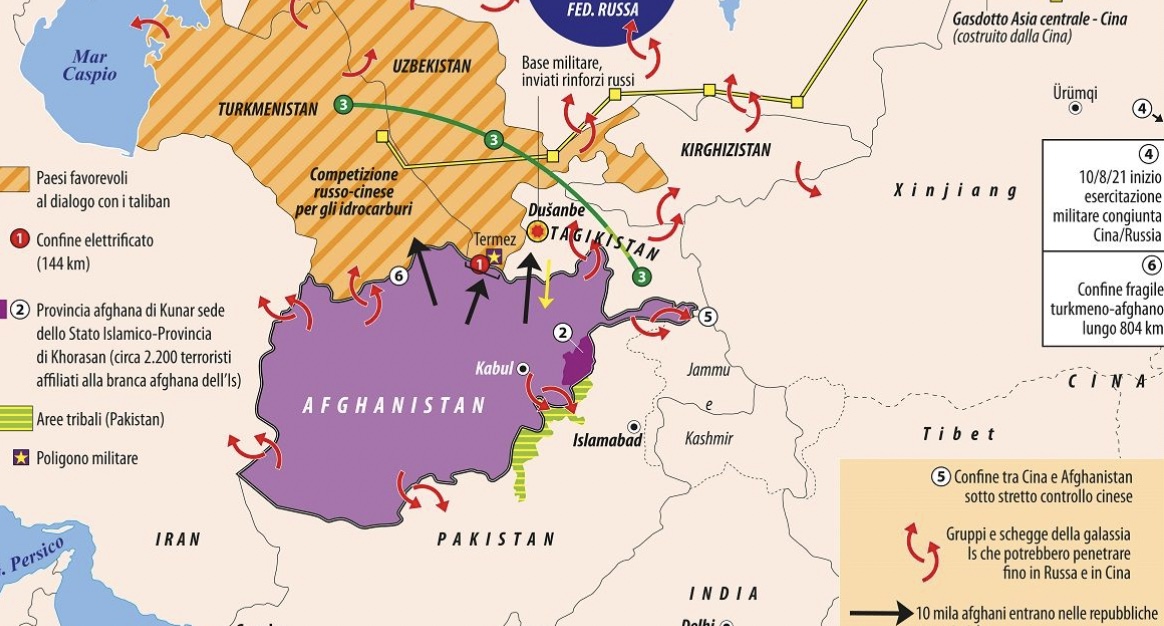The Afghan Taliban are said to be in talks with Russia to import 1 million tons of petroleum products, giving in exchange raw materials for medicines and mineral resources.
A Taliban delegation is currently in Moscow for meetings with Russian officials and private companies to strengthen trade ties and encourage investment in the South Asian nation.
Russian officials said the Kabul delegation was also discussing the import of other essential products, including wheat and sunflower.
The Taliban Minister of Industry and Commerce Nuriddin Azizi, according to the Russian media, he allegedly said that his country needs over 4 million tons of oil which it already imports in part from neighboring countries.
Azizi told RIA Novosti: "Since Russia is a friendly country to us, we have come here to reach an agreement on the import of Russian oil and other petroleum products. We plan to import around one million tons of petrol and diesel ”.
Last month the Taliban signed an agreement with neighboring Iran to purchase 350.000 tons of oil. The minister said his government would like to conclude the deal as soon as possible.
Azizi also said that the United States and the European Union have not imposed sanctions on Afghanistan in terms of importing raw materials. "Afghanistan can pay for these goods with money."
Asked if his government would allow Russian investments in Afghanistan's mineral deposits, including lithium, Azizi said the Taliban "they can supply Russia with some of our minerals in exchange for imports"Of energy resources. "We have a very good and high quality lithium. "
The Taliban minister also said that Kabul is already supplying raw materials to factories in China and can supply Russia with the same raw materials.
China, along with Russia, Turkey, neighboring Pakistan, Iran, Uzbekistan and other Central Asian countries, kept its embassy open after the Taliban took power. Western nations, on the other hand, have moved their diplomatic missions to Qatar.
The Chinese government has provided urgent humanitarian aid and has tried to help the cash-strapped Afghan government cope with economic turmoil. He also urged Washington to release about $ 7 billion in frozen Afghan foreign reserves, which the Kabul central bank deposited with the Federal Reserve Bank of New York as soon as the Taliban seized power.
The Biden administration says it is working on making half of the funds available to the Afghan people, but this effort appears to have come to a halt after the discovery that the al-Qaeda leader had taken refuge in Kabul.
State Department spokesman Ned Price on Monday said the administration was looking for alternative ways to direct money to help Afghans in the throes of a deep-seated food crisis.
"We are examining the mechanisms that could be put in place to ensure that these $ 3,5 billion in preserved goods reach the Afghan people efficiently and effectively and are not diverted to terrorist groups or elsewhere. "Price said. The rest of the $ 7 billion was set aside to settle pending lawsuits in the United States.
China's Special Envoy for Afghan Affairs, Yue Xiaoyong, during a visit this week to the neighboring country affected by unrest, noted that "stability is gaining ground " in Afghanistan. On Thursday he told the official Chinese CGTN broadcasters that it was "necessary" to engage with the Taliban and accelerate "practical cooperation" with Afghanistan.
"Any real help for the Afghan people can hardly be realized if the Afghan authority is bypassed ", Yue pointed out in the comments to the CGTN.
The Taliban's restrictions on women's rights to work, education and political participation have prevented the international community from recognizing their government and dealing directly with them.
"Although many have paid close attention to the inclusive government structure, women's rights and the education of middle school girls in Afghanistan, it is important to know that addressing these issues is not incompatible with economic reconstruction.“, Said the Chinese correspondent.
China also recently announced that it will not apply tariffs on 98% of goods imported from Afghanistan in an effort to strengthen bilateral trade ties and help the Taliban restart the economy of the sanctioned country.
"We have also imported exclusive products such as pine nuts, saffron, almonds, figs and raisins and have fulfilled our pledge of one billion yuan (147 million dollars) of aid for humanitarian and development purposes to alleviate the hardships of the Afghan people "Yue said.
Yue reiterated Beijing's call for the Taliban to keep their promise to counter terrorism by adopting "visible, tangible and verifiable measures".
Chinese engagement with Islamic rulers is primarily aimed at encouraging them to prevent fugitive members of the outlawed East Turkistan Islamic movement from using Afghan soil for attacks on China. Insurgents say they are fighting for the rights of Uighur Muslims in the western province of Xinjiang, which borders Afghanistan.
The neighbour Pakistan it has also significantly increased coal imports from Afghanistan and Central Asian countries via Afghan territory, which helps the Taliban generate new revenue needed to rule the country.
Pakistan imported 70% of its thermal coal from South Africa to run its China-built cement, steel and power plants, but Islamabad is currently facing a payments crisis due to rising international prices and decrease in foreign cash reserves.
This prompted the Pakistani authorities to increase coal imports from Afghanistan. Officials in Pakistan say Afghan coal is relatively cheap - around 40% of the value of the international market - and takes less time to acquire.
